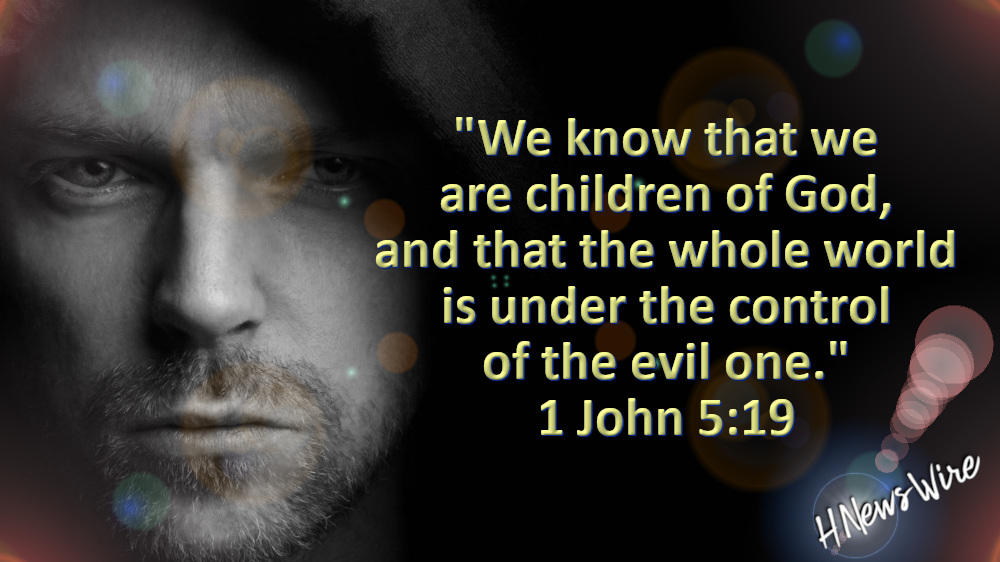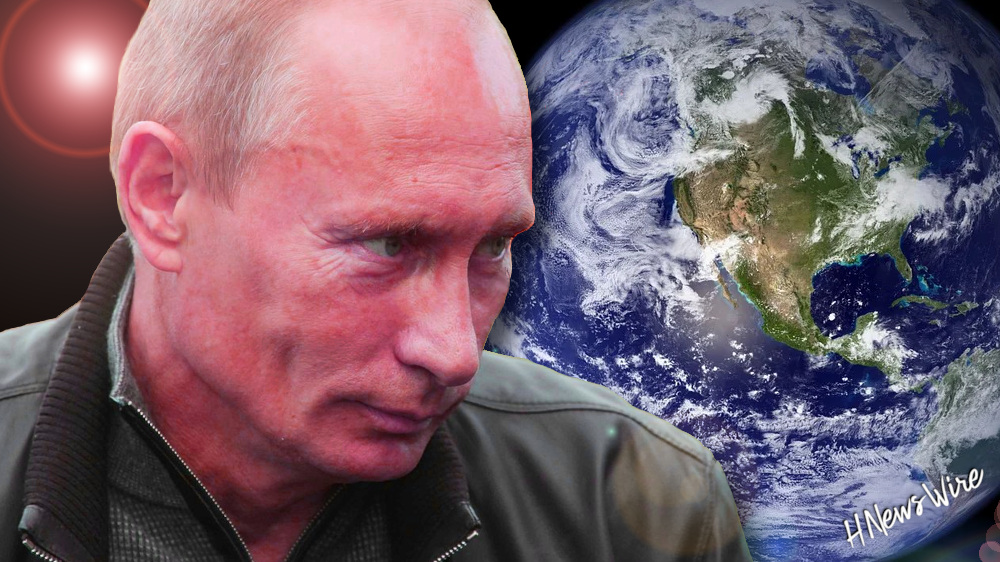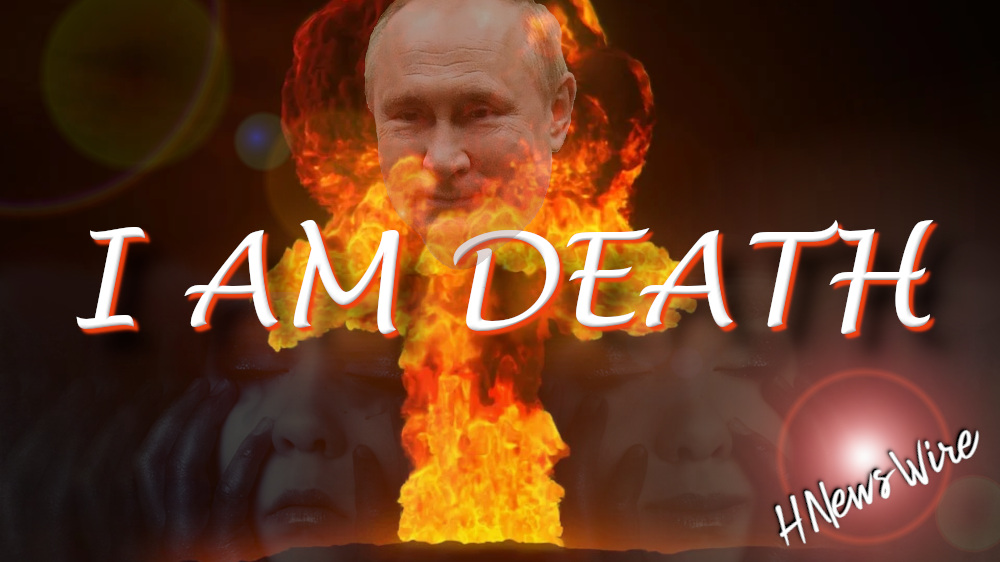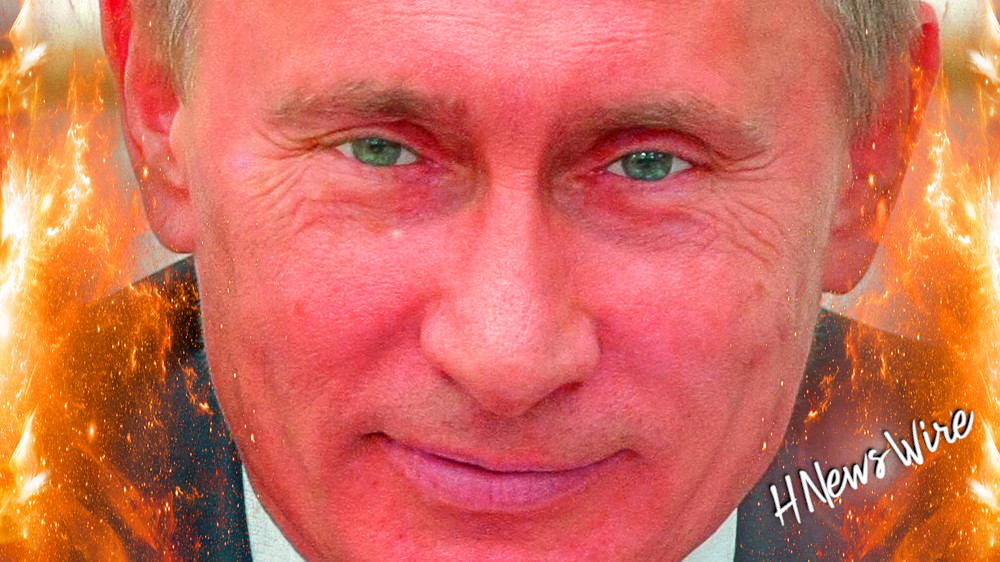Watchman: What Else Has Changed? Every Time They Are Detected,(Priest) These Vile SOB Satan Soldiers Simply Get Sent to Another Parish to Repeat the Entire Ordeal. They Adore, Savor, and Idolize the Torture of Children and the Rape of Women. My Astonishment at Those Who Choose to Remain in This Demonic Cult Never Ends

Pope Francis Meets With Jesuits In Portugal, Says Church Needs To Be More Flexible On Sodomy And ‘Sins Of The Flesh,’ Hints That Vatican II Council May Soon End
HNewsWire:
“There are many who question Vatican II without naming it. They question the teachings of Vatican II. And if I look to the future, I think we have to follow the Spirit, see what it tells us, with courage,” Francis said.
The following report is by Crux/The Catholic Herald, including some minor editions from the original transcript added in:
ROME – In a wide-ranging conversation with Jesuits in Portugal during his visit to Lisbon earlier this month for World Youth Day, Pope Francis touched on several hot-button topics, including the need for the Church to be more flexible when it comes to homosexuals and so-called “sins of the flesh”. He also discussed criticism of his papacy among US Catholics and problems of chastity among clergy.
SEE: Pope Francis Says That Pedophile Priests Are ‘God’s Children’ In Meeting With Hungarian Jesuits
In a private August 5 meeting with Jesuits during his visit to Portugal, Francis spoke to the roughly 130 Jesuits and answered several questions, including one from a Jesuit named Francisco who said he had spent a year on sabbatical in the United States and was troubled by the number of people, including bishops, who were critical of Francis’s papacy.
In his response, Francis said, “You have seen that in the United States the situation is not easy: There is a very strong reactionary attitude”.
This attitude “is organised and shapes the way people belong, even emotionally,” he said, and cautioned against what he calls “indietrismo”, meaning being backward-looking, saying this attitude “is useless and we need to understand that there is an appropriate evolution in the understanding of matters of faith and morals”.
He quoted from 5th century Gallic monk Vincent of Lérins, who said, “You develop a doctrine so that it is consolidated in years, expanded in time, and exalted by age.”
Doctrine also progresses, expands and consolidates with time and becomes firmer, but is always progressing. Change develops from the roots upward, growing in accord with these three criteria.
Francis said.
To this end, the pope pointed to changes in the Catholic Church’s position on issues such as slavery, nuclear weapons, and the death penalty, saying the development of these teachings implies upward movement and shows that “change is necessary”.
Vincent of Lérins, he said, also makes a comparison between human biological development and the transmission of faith over the passage of time, saying, “Our understanding of the human person changes with time, and our consciousness also deepens”.
“The view of Church doctrine as monolithic is erroneous,” Francis said, saying some people “opt out” from this process of change and understanding, and “they go backward”.
“When you go backward, you form something closed, disconnected from the roots of the Church and you lose the sap of revelation,” he said, insisting that if healthy change is not embraced, “You go backward, and then you take on criteria for change other than those our faith gives for growth and change”.
Pope Francis said the effects of going backwards on morality “are devastating”, and that “the problems that moralists have to examine today are very serious, and to deal with them they have to take the risk of making changes, but in the direction I was saying”.
Again referring to the situation in the United States and the “climate of closure” among some American Catholics, the pope said this climate is present in some areas and when this is the case, “You can lose the true tradition and turn to ideologies for support”.
“In other words, ideology replaces faith, membership of a sector of the Church replaces membership of the Church,” he said.
Those American groups you talk about, so closed, are isolating themselves. Instead of living by doctrine, by the true doctrine that always develops and bears fruit, they live by ideologies. When you abandon doctrine in life to replace it with an ideology, you have lost, you have lost as in war.
He said.
Asked about Catholic homosexuals who lead overall virtuous lives but believe their relationships aren’t sinful, Pope Francis spoke about the need for the Church to be welcoming and to be more flexible when it comes to so-called “sins of the flesh”.
He insisted, as he has done repeatedly, including several times in Portugal, that in the Gospels,
There is no discussion about the call being addressed to everyone. Jesus is very clear about this: Everyone.
Everyone has their own space in the Church, [and as pastors], We help people live so that they can occupy that place with maturity, and this applies to all kinds of people.
He said
Noting that there is a priest in the Diocese of Rome who works with the LGBTQ+ community, the pope said the issue of homosexuality in modern society “is very strong, and the sensitivity in this regard changes according to historical circumstances”.
Pope Francis said that one thing he does not like is that “we look at the so-called ‘sins of the flesh’ with a magnifying glass, just as we have done for so long for the sixth commandment”.
“If you exploited workers, if you lied or cheated, it didn’t matter, and instead sins below the waist were relevant,” he said.
When it comes to the individuals involved, “The most appropriate pastoral attitude for each person must be applied,” he said.
We must not be superficial and naive, forcing people into things and behaviours for which they are not yet mature, or are not capable. It takes a lot of sensitivity and creativity to accompany people spiritually and pastorally.
Francis insisted that as pastors
He then noted that his Wednesday general audiences are attended by a Charles de Foucauld sister named Sister Geneviève, who is in her eighties and is a chaplain at the Circus in Rome with two other sisters.
These sisters, the pope said, live in a mobile home near the circus and have a little chapel there, and they work a lot with people who are transgender individuals. He said he visited their house one day and when one of the nuns asked if she could bring the transgender people, he said yes.
“Then, after the first surprise, they made a habit of coming. Some write to me, and I email them back…I realised that these people feel rejected, and it is really hard,” he said, but insisted that, “everyone is called to live in the Church: never forget that”.
Pope Francis was also asked by the youngest Jesuit in the province how to develop and live out a proper formation in a hyper-sexualised and consumerist society.
In his response, the pope said, “We live in a worldly society, which worries me a lot,” calling spiritual worldliness a “recurring pitfall” that also effects consecrated life.
You have to learn to distinguish: it is one thing to prepare for dialogue with the world – as you do with dialogue with the worlds of art and culture – it is another thing to compromise yourself with the things of the world, with worldliness.
He said
Francis stressed the importance of dialoging with the world, “for we cannot live as though preserved like pickled food”.
We must not be introverted religionists, smiling inwardly, talking inwardly, protecting our environment without engaging with anyone. We have to go out into this world with its values and faults.
He said.
The pope then recalled a speech he gave to priests working in the curia last year, during which he spoke about pornography and cell phone use and asked how many of them watch porn on their phones. One of priest, he said, later commented that, “You can see that he has spent hours in the confessional”.
In the past, problems such as this were more hidden, but “today, thank God, the door is wide open, and there is no reason for problems to remain hidden”.
“If you hide your problems, it is because you choose to do so, but it is not the fault of society, or even your religious community,” he said, saying one of the greatest current risks are the “hidden refuges of self-seeking, which many times involve sexuality, but also other matters”.
Pope Francis said that “I am not afraid of sexualised society”, but is more afraid of “how we relate to it. I am afraid of worldly criteria,” a term he said “encompasses everything, for example, the eagerness to promote oneself, the eagerness to stand out”.
In the lengthy Q&A session, the pope also spoke about prioritising the poor and accompanying them so they do not become embittered, saying that in today’s world, “spirituality itself is leading us in that direction, toward an engagement with those on the margins, not only on the margin of religion, but also on the margin of life”.
He also touched on the Second Vatican Council and his “dream” for the future of the church, noting that many Catholics “question Vatican II without naming it. They question the teachings of Vatican II”.
There are many who question Vatican II without naming it. They question the teachings of Vatican II. And if I look to the future, I think we have to follow the Spirit, see what it tells us, with courage. Last week I read the document that takes stock of the state of the Society of Jesus, De statu Societatis. It talks about today, but always with openness. It indicates the possibility of moving forward, the need to continue on that path. So, my dream for the future is to be open to what the Spirit is telling us, open to discernment and not caught up with functionalism.
I am well aware of Arrupe’s “testament” delivered when in Thailand he addressed the Jesuits who were in charge of refugee centers. What did he speak to them about? About prayer. To those people who were completely engaged in working with refugees, he spoke about prayer. On the return trip he had a stroke, so that was his testament.
With prayer the Jesuit goes forward, afraid of nothing, because he knows that the Lord will inspire him in due time as to what he must do. When a Jesuit does not pray, he becomes a desiccated Jesuit. In Portugal one would say he has become a baccalà, a dried and salted codfish.
Francis also spoke on the problem of clericalism among both priests and laity, saying it affects both, but is “worse when it creeps into the laity. The clericalised laity are frightening”.
He also touched on the vocations crisis, including within the Jesuit order, as well as his own joys and challenges.
Pope Francis said that his greatest joy at the moment is “the preparation for the synod, even though sometimes I see, in some parts, that there are shortcomings in the way it is being conducted”.
Referring to the theme for the upcoming Synod of Bishops on Synodality, he said the aim “is not about going after votes, as a political party would”.
It is not about preferences, about belonging to this or that party. In a synod, the principal figure is the Holy Spirit. He is the protagonist. So, you have to let the Spirit lead things.
He said, saying his greatest concern right now is war and the various conflicts raging throughout the world.
AUTHOR COMMENTARY
I am not going to comment on all the nonsense Frankie had to say but I will touch on a few things:
Firstly, he talks about how doctrine “progresses, expands and consolidates with time and becomes firmer, but is always progressing. Change develops from the roots upward, growing in accord with these three criteria;” and then, in typical Jesuit sophistry, then contradicts this by saying that by ditching doctrine you replace it with “ideologies,” which is a bad thing to him, even though he just said doctrine is supposed to progress.
[21] My son, fear thou the LORD and the king: and meddle not with them that are given to change: [22] For their calamity shall rise suddenly; and who knoweth the ruin of them both?
Proverbs 24:21-22
Then you got this devil telling people we should not eagle-eye “the sins of the flesh” – the same maniac that tells other Jesuits that pedophile priests are still “children of God.” But Rome has never cared about sanctification: they only talk about it to give a “shew of wisdom in will worship” (Colossians 2:23).
Having therefore these promises, dearly beloved, let us cleanse ourselves from all filthiness of the flesh and spirit, perfecting holiness in the fear of God.
2 Corinthians 7:1
The other part I found interesting was comments on Vatican II Council. It sounds to me like he is giving the slip that Rome may soon look to transition out of it now. Prior to Vatican II in the 60’s, the Vatican viewed those outside of them as heretics and blasphemers, worthy of anathema and death; but then that was erased and then called their enemies “separated brethren” in a new ecumenical, liberal-progressive approach. This is what they did under Constantine when they declared Christianity the new state religion, and all the pagan idols and superstitions became Christian icons and “saints” and traditions; to appease the Romans, bring all other pagans, and then seduce the real believers.
But when Rome got everyone under their thumb then persecution went into hyperdrive, as well all know.
The same has occurred with Vatican II. All denominations have now been fully compromised and placed under Rome’s control, and the true believers are scattered, divided, and ensnared with all of Rome’s pleasures.
With the way that the world is at right now the Vatican is looking to enforce a new change soon, once the dust settles from the coming fallout in the West here in these next few years…
[5] And upon her forehead was a name written, MYSTERY, BABYLON THE GREAT, THE MOTHER OF HARLOTS AND ABOMINATIONS OF THE EARTH. [6] And I saw the woman drunken with the blood of the saints, and with the blood of the martyrs of Jesus: and when I saw her, I wondered with great admiration. [18] And the woman which thou sawest is that great city, which reigneth over the kings of the earth.
Revelation 17:5-6, 18
[7] Who goeth a warfare any time at his own charges? who planteth a vineyard, and eateth not of the fruit thereof? or who feedeth a flock, and eateth not of the milk of the flock? [8] Say I these things as a man? or saith not the law the same also? [9] For it is written in the law of Moses, Thou shalt not muzzle the mouth of the ox that treadeth out the corn. Doth God take care for oxen? [10] Or saith he it altogether for our sakes? For our sakes, no doubt, this is written: that he that ploweth should plow in hope; and that he that thresheth in hope should be partaker of his hope. (1 Corinthians 9:7-10).
The WinePress needs your support! If God has laid it on your heart to want to contribute, please prayerfully consider donating to this ministry. If you cannot gift a monetary donation, then please donate your fervent prayers to keep this ministry going! Thank you and may God bless you.
CLICK HERE TO DONATE

Demonic Pope Francis Says That Pedophile Priests Are ‘God’s Children’ In Meeting With Hungarian Jesuits
HNewsWire:
“How do we approach, how do we talk to the abusers for whom we feel revulsion? Yes, they too are children of God. But how can you love them? It’s a powerful question. The abuser is to be condemned, indeed, but as a brother. Condemning him is to be understood as an act of charity.”
In a private discourse with 32 other Jesuits in Hungary, Pope Francis said that Roman Catholic priests who are pedophiles are children of God who must be shown “Christian love,” but still need to be punished.
“Even talking to the abuser involves revulsion; it’s not easy. But they are God’s children too,” the Pope said, adding, “they need a punishment but also pastoral care. How do you do that? No, it’s not easy.”
The Jesuitical discourse was reported by the Italian Jesuit publication La Civilta Cattolica, citing statements Francis and other Jesuit priests made during a private meeting in Budapest, Hungary. The meeting occurred on April 29th but was recently brought to light by the Jesuit outlet earlier this week.
Last month The WinePress reported on an interview published exclusively to the streaming service Disney+, where the Pope had a chat with teens about different issues they have with Catholicism and the problems with the priesthood, of which included abuse and pederasty among many priests. The children blasted Francis and the Catholic church for not doing nowhere near enough to address the problem, but Francis calmly tried to assure them that something will be done to minimize the problem.
There are men and women who destroy. The abuser destroys a child, and if it’s a church person, the hypocrisy and double life are horrific.
I can’t possibly convey the empathy I feel for a person who has been abused, but it pains me deeply. We’ve been clear about this, we’ve disciplined the seminaries, we’ve punished the abusing priests or even the abusing laypeople.
It’s a serious social problem. We’re beginning to raise social awareness. That is key.
He said in the documentary
But it appears that when Francis is not filming a movie featured on Disney he says these priests need to be shown love.
The full report by La Civilta Cattolica can be read below, where Francis and the Jesuits in attendance discussed other issues as well:
During the second day of his apostolic trip to Hungary, on April 29, Pope Francis met with the country’s Jesuits.
Around 6 p.m. he entered the Nunciature Hall, where 32 Jesuits were gathered, including the provincial, Fr. Attila András. He then greeted many of them, one by one. The meeting began with words of welcome from Fr. András, who presented the situation in the province. Then the pope thanked him and said, “Now ask the questions you want. Thank you!” The Jesuits would have liked to give a gift for each answer given – “a game,” said the socius to the provincial, Fr. Koronkai Zoltán. Francis laughed heartily, but asked them to ask all the questions first, and then at the end to give the gifts all together, because he feared there would not be enough time.
The first question was about youth ministry: how do we best engage with young people?
For me the key word is “testimony.” Without testimony, without witnessing, nothing can be done. You end up like that beautiful song by Mina: “parole, parole, parole…” (words, words, words). Without testimony nothing happens. And testimony means consistency of life.
Dear Pope Francis, it is a joy to have you with us. What prompted you to return to Hungary after your 2021 trip?
The reason is that the first time I had to go to Slovakia, but Budapest was having the Eucharistic Congress. So I came here for a few hours. At the time, I made a promise to come back, and here I am!
Regarding young people in formation in the Society of Jesus and young people more generally, what advice do you have for us?
Speak clearly. It used to be said that to be a good Jesuit you had to think clearly and speak obscurely. But with young people that does not work: you have to speak clearly, show them consistency. Young people have a nose for when there is no consistency. With young people in formation you have to speak as to adults, as you speak to grown ups, not children. And introduce them to spiritual experience; prepare them for the great spiritual experience that is the Exercises. Young people do not tolerate double-speak, that is clear to me. But being clear does not mean being aggressive. Clarity must always be combined with amiability, fraternity, fatherhood.
The key word is “authenticity.” Let young people say what they feel. For me, dialogue between a young person and an older person is important: talking, discussing. I expect authenticity, that people speak of things as they are: difficulties, sins. As a formation facilitator you have to teach young people consistency. And it is important for the young to dialogue with the old. The old people cannot be in the infirmary alone; they have to be in community, so that exchanges between them and young people are possible. Remember that prophecy of Joel: the old will have dreams and the young will be prophets. The prophecy of a young person is one that comes from a tender relationship with the old. “Tenderness” is one of God’s key words: closeness, compassion and tenderness. On this path we will never go wrong. This is God’s style.
I would like to ask a question on the topic of Christian love for those who have committed sexual abuse. The Gospel asks us to love, but how do we love at the same time people who have experienced abuse and their abusers? God loves everyone. He loves them, too. But what about us? Without ever covering anything up, of course, how do we love abusers? I would like to offer the compassion and love that the Gospel asks for everyone, even the enemy. But how is this possible?
It is not easy at all. Today we understand that the reality of abuse is very broad: there is sexual abuse, psychological abuse, economic abuse, migrant abuse. You refer to sexual abuse. How do we approach, how do we talk to the abusers for whom we feel revulsion? Yes, they too are children of God. But how can you love them? It’s a powerful question. The abuser is to be condemned, indeed, but as a brother. Condemning him is to be understood as an act of charity. There is a logic, a form of loving the enemy that is also expressed in this way. And it is not easy to understand and to live out. The abuser is an enemy. Each of us feels this because we empathize with the suffering of the abused. When you hear what abuse leaves in the hearts of abused people, the impression you get is very powerful. Even talking to the abuser involves revulsion; it’s not easy. But they are God’s children too. They deserve punishment, but they also deserve pastoral care. How do we provide that? No, it is not easy. You are right.
What was your relationship with Fr. Ferenc Jálics? What happened? How did you as provincial experience that tragic situation? Serious accusations have been made against you.
Fathers Ferenc Jálics and Orlando Yorio ministered in a working-class neighborhood and worked hard. Jálics was my spiritual father and confessor during my first and second years of theology. In the neighborhood where he worked there was a guerrilla cell. But the two Jesuits had nothing to do with them: they were pastors, not politicians. They were innocent when taken prisoner. The military found nothing to charge them with, but they had to spend nine months in prison, suffering threats and torture. Then they were released, but these things leave deep wounds. Jálics immediately came to me and we talked. I advised him to go to his mother in the United States. The situation was really too confusing and uncertain. Then the legend developed that I had handed them over to be imprisoned. You should know that a month ago the Argentine Bishops’ Conference published two volumes, of three planned, with all the documents related to what happened between the Church and the military. You will find everything there.
But back to the events I was recounting. When the military left, Jálics asked my permission to come to do a course of Spiritual Exercises in Argentina. I let him come, and we even celebrated Mass together. Then I saw him again as archbishop and then again also as pope; he came to Rome to see me. We always maintained this relationship. But when he came the last time to see me in the Vatican, I could see that he was suffering because he didn’t know how to talk to me. There was a distance. The wounds of those past years remained both in me and in him, because we both experienced that persecution.
Some people in the government wanted to “cut my head off,” and they brought up not so much this issue of Jálics, but they questioned my whole way of acting during the dictatorship. So they put me on trial. I was given the choice of where to hold the hearing. I chose to have it in the episcopal residence. It lasted four hours and 10 minutes. One of the judges was very insistent in his questioning about the way I behaved. I always answered truthfully. But, from my point of view, the only serious question, with substance and well expressed, came from the lawyer who belonged to the Communist Party. And thanks to that question, things were clarified. In the end, my innocence was established. But in that judgment there was almost no mention of Jàlics, but of other cases of people who had asked for help.
I then saw again here in Rome as pope two of those judges. One together with a group of Argentineans. I didn’t recognize him, but I had the impression that I had seen him. I was looking at him, looking at him. I was saying to myself, “but I know him.” He hugged me and left. I then saw him again and he introduced himself. I told him, “I deserve a hundred times punishment, but not for that reason.” I told him to be at peace with it. Yes, I deserve judgment for my sins, but on this point I want to be clear. Another one of the three judges also came, and he told me clearly that they had received instructions from the government to convict me.
But I want to add that when Jálics and Yorio were taken by the military, the situation in Argentina was bewildering and it was not at all clear what should be done. I did what I felt I had to do to defend them. It was a very painful affair.
Jálics was a good man, a man of God, a man who sought God, but he fell victim to an entourage to which he did not belong. He himself understood this. That entourage was the active resistance in the place where he went to be a chaplain. You will find the truth about this case in the two volumes of documents that have been published.
The Second Vatican Council talks about the relationship between the Church and the modern world. How can we reconcile the Church and the reality that is already beyond the modern? How do we find God’s voice while loving our time?
I wouldn’t know how to answer that theoretically, but I certainly know that the Council is still being applied. It takes a century for a Council to be assimilated, they say. And I know the resistance to its decrees is terrible. There is unbelievable restorationism, what I call “indietrismo” (backwardness), as the Letter to the Hebrews (10:39) says: “But we do not belong to those who shrink back.” The flow of history and grace goes from the roots upward like the sap of a tree that bears fruit. But without this flow you remain a mummy. Going backwards does not preserve life, ever. You must change, as St. Vincent of Lérins wrote in his Commonitory when he remarked that even the dogma of the Christian religion progresses, consolidating over the years, developing with time, deepening with age. But this is a change from the bottom up. The danger today is indietrismo, the reaction against the modern. It is a nostalgic disease. This is why I decided that now the permission to celebrate according to the Roman Missal of 1962 is mandatory for all newly consecrated priests. After all the necessary consultations, I decided this because I saw that the good pastoral measures put in place by John Paul II and Benedict XVI were being used in an ideological way, to go backward. It was necessary to stop this indietrismo, which was not in the pastoral vision of my predecessors.
My priestly ordination is coming up in three weeks. Do you remember what your priestly ordination was like? Would you like to give advice to a newly ordained priest?
There were five of us, and two of us are still living. I have a good memory. And I’m grateful to the superiors who prepared us well, and made a beautiful, simple celebration without pomp or ostentation in the Faculty Garden. Beautiful moments. And it was also nice for me to see that there was a group of my comrades from the chemical laboratory where I worked, all atheists and communists. They were present! One of them was seized and then killed by the military. You want some advice: don’t stray from the old people!
***
At the end, Francis stood up and said, “Thank you so much for this visit. We can pray to Our Lady and then I will give the blessing.” The pope received various gifts, which each person presented giving detailed explanations. Then Francis greeted individually those he had not greeted on entering and a group photo was taken.
SEE: Pope Francis Says ‘Being Homosexual Is Not A Crime’
AUTHOR COMMENTARY
And upon her forehead was a name written, MYSTERY, BABYLON THE GREAT, THE MOTHER OF HARLOTS AND ABOMINATIONS OF THE EARTH.
Revelation 17:5
What is else new? These evil sons of Satan adore, relish, and worship the abuse of children and rape of women; and every time they got caught, they just get sent to another parish to do the whole thing all over again. The people that stay in this satanic cult never ceases to amaze me.
[7] Who goeth a warfare any time at his own charges? who planteth a vineyard, and eateth not of the fruit thereof? or who feedeth a flock, and eateth not of the milk of the flock? [8] Say I these things as a man? or saith not the law the same also? [9] For it is written in the law of Moses, Thou shalt not muzzle the mouth of the ox that treadeth out the corn. Doth God take care for oxen? [10] Or saith he it altogether for our sakes? For our sakes, no doubt, this is written: that he that ploweth should plow in hope; and that he that thresheth in hope should be partaker of his hope. (1 Corinthians 9:7-10).
The WinePress needs your support! If God has laid it on your heart to want to contribute, please prayerfully consider donating to this ministry. If you cannot gift a monetary donation, then please donate your fervent prayers to keep this ministry going! Thank you and may God bless you.
CLICK HERE TO DONATE

Be gentle with your skin. Our soaps are kind to your skin and create a creamy, silky lather that is nourishing. Small batches are made by hand. We only use the best natural ingredients. There are no chemicals, phthalates, parabens, sodium laurel sulfate, or detergents. GraniteRidgeSoapworks
Use the code HNEWS10 to receive 10% off your first purchase.

Revelation: A Blueprint for the Great Tribulation
A Watchman Is Awakened


Will Putin Fulfill Biblical Prophecy and Attack Israel?
Newsletter
Orphans

Editor's Bio

A Thrilling Ride
Every once in awhile, a book comes across your path that is impossible to put down. A Long Journey Home is not a casual book that you read in a week or earmark to complete at a later date. Once you begin, cancel your schedule, put your phone on silent, find a quiet place where you cannot be disturbed, and complete the journey. Click Here to Purchase on Amazon.com!
Recent News
Reach People










